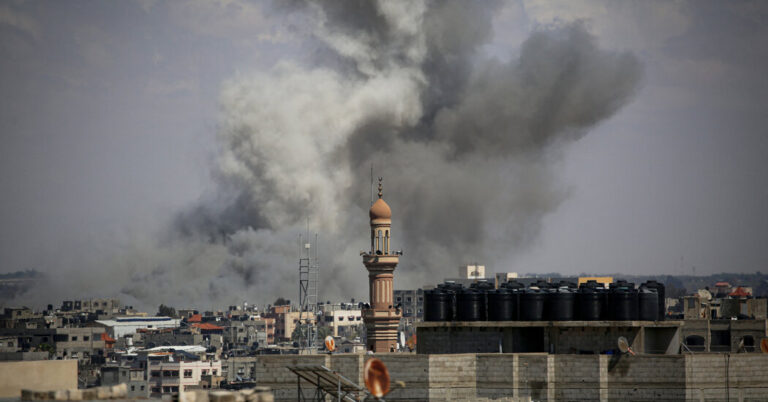A sense of panic gripped Rafah, in southern Gaza, on Monday after Israel issued an evacuation order for parts of the city, which has become home to more than a million Palestinians seeking refuge after seven months of war.
People took down their tents in the pouring rain. Fuel and food prices have skyrocketed. And some weighed the potential risk of staying against the dangers of crossing into a war zone.
“If we have to leave, we will enter the unknown,” said Nidal Kuhail, 29, a resident of Gaza City who took refuge in Rafah with his family. “Are we going to have a place to go?” Will we be able to find a place to set up the tent?
His tent is in a part of Rafah that is not covered by evacuation orderbut his family was still anxious and divided over what to do next.
“Some say, ‘Let’s leave here early,’ and others say, ‘Let’s wait a while,'” said Mr. Kuhail, who worked as a manager at a Thai restaurant in Gaza City before the war.
Field workers with UNRWA, the United Nations agency helping Palestinian refugees, estimated Monday that about 200 people per hour were fleeing the evacuation zone through the main exit routes, Sam Rose said , director of planning for the humanitarian agency, who spent the last two weeks in Gaza.
The atmosphere in Rafah was hopeful over the weekend, as reports of progress in ceasefire talks emerged, Mr. Rose said. But that optimism turned to pervasive fear and anxiety after Israel issued its evacuation order for eastern parts of the city, indicating it could move forward with a planned ground invasion as he was trying to dismantle Hamas in Gaza.
Many in Rafah said they knew they had to leave, but did not know how to do it.
Mousa Ramadan al-Bahabsa, 55, was sheltering with his 11 children in a tent he had erected at a United Nations school near al-Najma Square in Rafah. They have moved three times since the war began in October, he said.
After the evacuation order was issued, he said, residents of the school looked at each other in shock. So many started packing their things. But he didn’t have enough money to leave.
“All the people around me are evacuating,” said Mr. al-Bahabsa, who said the war had left him penniless. “I don’t know where to go or who to ask for help. »
Leaving Rafah is expensive, Palestinians interviewed there said on Monday. Even if the Israeli military tells people to move to an area less than 10 miles away, taking a taxi out of town would cost more than $260, and leaving in a smaller rickshaw would cost half that. this amount. A cart pulled by a donkey would cost about $13, but even that is too expensive for many people.
The order also led to a rise in prices, Palestinians in Rafah said. The cost of fuel rose from $8 to $12 per liter, as did the cost of basic food items like sugar, which rose from $3 to $10 per kilo, they said.
“I don’t even have 1 shekel,” Mr. al-Bahabsa said, referring to the currency used in Israel and Gaza. “I’ve already lost my house, but I don’t want to lose any of my children. »
Across town, Malak Barbakh, 38, tried to gather her eight children while her husband packed their belongings. But her eldest son had run away somewhere, she said, after telling them he didn’t want to leave Rafah after sheltering there for so long.
“What scares me the most is the unknown,” Ms. Barbakh said. “I’m so tired of this wicked life.”
To make things easier, she said, the family plans to return to her house in the town of Khan Younis, even though they know she is no longer there.
“I hope we can build our tent on the rubble of our house,” she said.
The evacuation order came as a shock to Mahmoud Mohammed al-Burdeiny, 26. He said he believed Israel had used the idea of an invasion of Rafah only as a bluff to get a better deal from Hamas in ceasefire talks.
This meant he had no plans to leave his home southeast of Rafah. But now he felt the danger was real and he had spent the morning watching his neighbors flee.
“I saw the long road along the beach full of trucks, vans and cars,” said Mr. al-Burdeiny, who worked as a taxi driver before the war. He said the sight made him feel “infected with the disease of departure, like the others.”
So Mr. al-Burdeiny and his wife began packing their belongings and preparing for the worst. They could take the doors of their house with them for shelter, they realized. And they could also dismantle their furniture to use as firewood.
Otherwise, Mr. al-Burdeiny feared, it would all end up being looted or buried under the rubble of an airstrike.
“I don’t want to see what happened to the people of Gaza City and the north happen again in Rafah,” he said. “I’m really, really worried about my whole family.”


